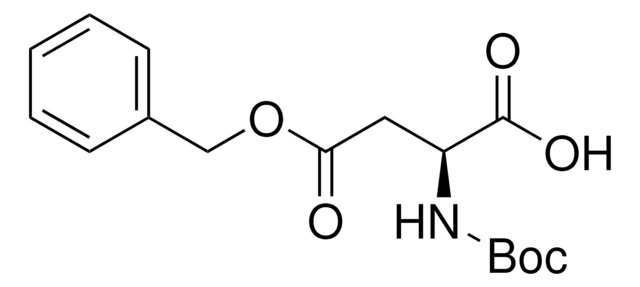I5386
Acide indole-3-butyrique
BioReagent, suitable for plant cell culture
Synonyme(s) :
Acide 4-(3-indolyl)butanoïque
About This Item
Produits recommandés
Gamme de produits
BioReagent
Technique(s)
cell culture | plant: suitable
Application(s)
agriculture
Température de stockage
2-8°C
Chaîne SMILES
OC(=O)CCCc1c[nH]c2ccccc12
InChI
1S/C12H13NO2/c14-12(15)7-3-4-9-8-13-11-6-2-1-5-10(9)11/h1-2,5-6,8,13H,3-4,7H2,(H,14,15)
Clé InChI
JTEDVYBZBROSJT-UHFFFAOYSA-N
Vous recherchez des produits similaires ? Visite Guide de comparaison des produits
Application
Notes préparatoires
Produit(s) apparenté(s)
Mention d'avertissement
Danger
Mentions de danger
Conseils de prudence
Classification des risques
Acute Tox. 3 Oral
Code de la classe de stockage
6.1C - Combustible acute toxic Cat.3 / toxic compounds or compounds which causing chronic effects
Classe de danger pour l'eau (WGK)
WGK 3
Point d'éclair (°F)
Not applicable
Point d'éclair (°C)
Not applicable
Équipement de protection individuelle
Eyeshields, Faceshields, Gloves, type P2 (EN 143) respirator cartridges
Certificats d'analyse (COA)
Recherchez un Certificats d'analyse (COA) en saisissant le numéro de lot du produit. Les numéros de lot figurent sur l'étiquette du produit après les mots "Lot" ou "Batch".
Déjà en possession de ce produit ?
Retrouvez la documentation relative aux produits que vous avez récemment achetés dans la Bibliothèque de documents.
Les clients ont également consulté
Protocoles
Reference guide and preparation guide for antibiotic and antimycotic use in plant tissue culture.
Reference guide and preparation guide for antibiotic and antimycotic use in plant tissue culture.
Reference guide and preparation guide for antibiotic and antimycotic use in plant tissue culture.
Reference guide and preparation guide for antibiotic and antimycotic use in plant tissue culture.
Notre équipe de scientifiques dispose d'une expérience dans tous les secteurs de la recherche, notamment en sciences de la vie, science des matériaux, synthèse chimique, chromatographie, analyse et dans de nombreux autres domaines..
Contacter notre Service technique








